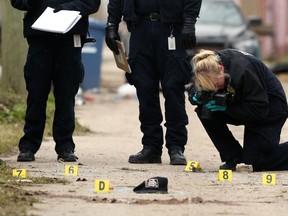
Article content
The latest budget update from the Winnipeg Police Service reveals a concerning trend: overtime costs have skyrocketed this year, with a 17% increase compared to the same period last year.
Advertisement 2
Story continues below
Article content
By the end of 2024, these costs are forecasted to hit an eye-watering $11.8 million — a staggering 57% rise from 2023. This is not just a budgetary issue — it’s a symptom of a system under severe strain — where police officers are stretched thin, working beyond their limits to keep our streets safe.
As police board chair Coun. Markus Chambers said in a recent interview, “The overtime levels are not sustainable.” I agree, and I’ve been saying so for years. But while the conversation around policing in Winnipeg often gets hijacked by loud social media voices and fleeting trends, the core issue remains the same: we need more police officers, not just to curb these unsustainable overtime costs but to ensure that our city remains safe and livable.
Article content
Advertisement 3
Story continues below
Article content
From 2018 to 2022, during my time as a city councillor, I consistently advocated for more resources for our police service. I voiced these concerns in the pages of the Winnipeg Sun and in council chambers. Yet, time and again, decisions were swayed by the shifting winds of public sentiment, often dictated by a vocal minority online.
The trend was to “defund the police,” a rallying cry echoed by many, including Chambers himself, along with numerous current NDP MLAs who proudly posted photos from defund rallies. Now, with violent crime surging and public safety a growing concern, we see a sudden reversal in rhetoric — but it’s too little, too late.
The fact is that Winnipeg’s police force is trying to manage today’s crime with yesterday’s resources. I was dismayed to learn that we have the same number of patrol cars on our streets as we did 20 years ago. This is a city whose population and geographic footprint have expanded significantly, yet our policing resources have not kept pace. This is not sustainable.
Advertisement 4
Story continues below
Article content
Chambers, Mayor Gillingham, and Councillor Janice Lukes have repeatedly voted against measures to increase police funding. At every turn, they have supported budgets that were designed to reduce the number of officers and cut overtime. This is the real problem: elected officials who lack the courage to make tough decisions, fearful of backlash from keyboard warriors. When it was trendy to defund the police, they jumped on that bandwagon. Now that the public mood has shifted, they want to look tough on crime, yet they balk at the costs associated with the inevitable overtime that comes with tackling violent crime.
Let’s be clear: as long as violent crime persists, so too will the need for overtime. When officers are called to a scene, they can’t just walk away because their shift ends. They stay until the job is done, protecting the community regardless of the hour. These are not opinions; they are facts, and they are irrefutable.
Advertisement 5
Story continues below
Article content
What Winnipeg needs is not just more funding to cover overtime; we need more officers to provide proactive, community-based policing. Adding more officers won’t immediately solve the overtime issue — it’s a process that takes time — but it’s a necessary step. We must invest in the police to meet the basic safety needs of our city.
Contrast this with how our city approaches fire services. We don’t hesitate to add firefighters or build new multi-million dollar fire stations based on response times and service demands. We recognize the critical need to ensure fire services are available and responsive when emergencies occur. Why do we not afford the same prioritization to police response times? Why is it that when it comes to law enforcement, we suddenly become shy about funding necessary resources?
Advertisement 6
Story continues below
Article content
The push for more police is not about creating a militarized state. It’s about ensuring the safety and security of our communities through proactive, community-focused policing. This kind of policing builds relationships with residents, understands neighbourhood dynamics, and works to prevent crime before it happens. It’s about investing in long-term solutions rather than simply reacting to emergencies.
Our current public safety model, much like our health-care system, operates almost exclusively in emergency mode. We react to crises rather than investing in preventative measures that could reduce the need for crisis interventions in the first place. Government spending is often shortsighted, focused on cutting immediate costs rather than making the necessary investments that would save money — and lives — in the long run.
Advertisement 7
Story continues below
Article content
We cannot continue to be reactive, nor can we allow political pandering to dictate our approach to public safety. The reality is that a safe city is a prosperous city. Business owners, families, and individuals need to feel secure in their neighbourhoods. This isn’t just about policing, it’s about building a city that values the safety and well-being of its residents.
The conversation about policing in Winnipeg needs to move beyond hashtags and viral trends. It’s time to invest in the resources our police need to keep us safe. More officers on the streets mean better response times, reduced overtime costs in the long term, and a safer city for everyone. The path forward is clear — we just need leaders with the backbone to take it.
— Kevin Klein is a former Tory cabinet minister, a former city councillor and President & CEO of Klein Group Ltd.
Have thoughts on what’s going on in Winnipeg, Manitoba, Canada or across the world? Send us a letter to the editor at wpgsun.letters@kleinmedia.ca
Article content
Comments